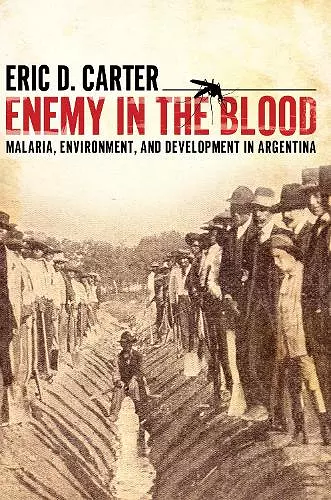Enemy in the Blood
Malaria, Environment, and Development in Argentina
Format:Paperback
Publisher:The University of Alabama Press
Published:30th Oct '20
Should be back in stock very soon

Enemy in the Blood: Malaria, Environment, and Development in Argentina examines the dramatic yet mostly forgotten history of malaria control in northwest Argentina. Carter traces the evolution of malaria science and policy in Argentina from the disease's emergence as a social problem in the 1890s to its effective eradication by 1950. Malaria-control proponents saw the campaign as part of a larger project of constructing a modern identity for Argentina. Insofar as development meant building a more productive, rational, and hygienic society, the perceptions of a culturally backwards and disease-ridden interior prevented Argentina from joining the ranks of 'modern' nations. The path to eradication, however, was not easy due to complicated public health politics, inappropriate application of foreign malaria control strategies, and a habitual misreading of the distinctive ecology of malaria in the northwest, especially the unique characteristics of the local mosquito vector. Homegrown scientific expertise, a populist public health agenda, and an infusion of new technologies eventually brought a rapid end to malaria's scourge, if not the cure for regional underdevelopment.
Enemy in the Blood sheds light on the often neglected history of northwest Argentina's interior, adds to critical perspectives on the history of development and public health in modern Latin America, and demonstrates the merits of integrative socialenvironmental research.
...the impressively well researched and referenced work has much to offer students of social, ecological, and medical history." —Lancet
"Deeply researched and thoughtfully argued, Enemy in the Blood represents an important contribution to the history of malaria." — Journal of the History of Medicine
"Carter does a nice job of satisfying those who demand 'theorization' without allowing cultural analysis-speak to overwhelm and obscure his narrative. The story is clearly and convincingly told, and the primary source usage is impressive." — Margaret Humphreys, author of Intensely Human: The Health of the Black Soldier in the American Civil War and Malaria: Poverty, Race, and Public Health in the United States
"Eric Carter's Enemy in the Blood makes an original, rigorous, and significant contribution to understanding the intertwined social/natural, conceptual/material processes involved in the role of epidemic diseases in the emergence of place. This book will be of great interest to historians, geographers, anthropologists, rural sociologists and, one hopes, epidemiologists." — Andrew Sluyter, author of Colonialism and Landscape: Postcolonial Theory and Applications
"A key element of the Argentine malaria campaign was to link the disease with place. Effective control strategies incorporated the geographical context. In a similar vein, Carter makes a convincing case that the history of medicine also benefits from close attention to the role of place. Deeply researched and thoughtfully argued, Enemy in the Blood represents an important contribution to the history of malaria." — Frederick R. Davis, Journal of the History of Medicine and Allied Sciences
ISBN: 9780817356927
Dimensions: 233mm x 154mm x 25mm
Weight: 475g
304 pages